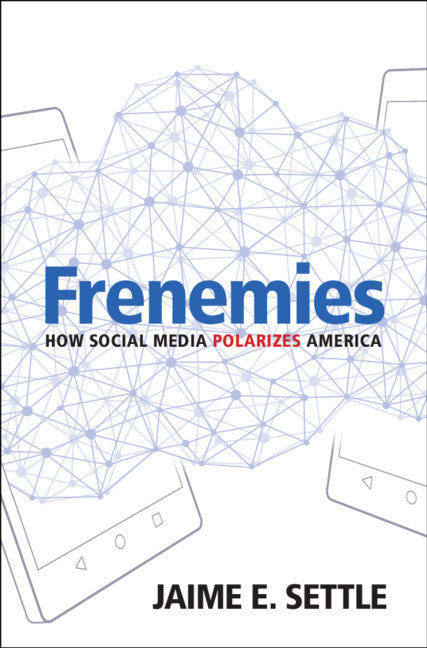Freshly Printed - allow 4 days lead
Couldn't load pickup availability
Frenemies
How Social Media Polarizes America
Social media is polarizing America: using Facebook causes Americans to negatively judge and stereotype those people with whom they disagree about politics.
Jaime E. Settle (Author)
9781108472531, Cambridge University Press
Hardback, published 30 August 2018
330 pages, 42 b/w illus. 26 tables
23.6 x 15.8 x 2.3 cm, 0.59 kg
'… the first comprehensive and truly novel theory of political communication on social media. The book provides a whole slew of testable hypotheses that should set the agenda for research on this topic for years to come.' Kevin Munger, Public Opinion Quarterly
Why do Americans have such animosity for people who identify with the opposing political party? Jaime E. Settle argues that in the context of increasing partisan polarization among American political elites, the way we communicate on Facebook uniquely facilitates psychological polarization among the American public. Frenemies introduces the END Framework of social media interaction. END refers to a subset of content that circulates in a social media ecosystem: a personalized, quantified blend of politically informative 'expression', 'news', and 'discussion' seamlessly interwoven into a wider variety of socially informative content. Scrolling through the News Feed triggers a cascade of processes that result in negative attitudes about those who disagree with us politically. The inherent features of Facebook, paired with the norms of how people use the site, heighten awareness of political identity, bias the inferences people make about others' political views, and foster stereotyped evaluations of the political out-group.
1. A fundamental change in political communication
2. Facebook in context: theorizing interaction on twenty-first century social media
3. The END framework of political interaction on social media
4. How do END interactions on the news feed psychologically polarize users?
5. In the eye of the beholder: politically informative news feed content
6. Political inference from content on the news feed
7. Biased inference from END interactions
8. Judging the other side
9. Erasing the coast of Bohemia in the era of social media
Appendix A
Appendix B.
Subject Areas: Media, information & communication industries [KNT], Political science & theory [JPA], Politics & government [JP], Social, group or collective psychology [JMH], Sociology: family & relationships [JHBK], Media studies [JFD]


